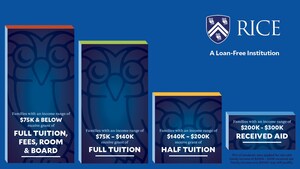Training for health certificates dramatically boosted Hispanic employment and income
Short-term programs also helped students overcome achievement gaps
HOUSTON, Oct. 21, 2021 /PRNewswire/ -- Short-term training programs for health care careers significantly boosted employment and income for Hispanics involved in a new study from Rice University, helping them overcome long-standing achievement gaps exacerbated by the COVID-19 pandemic.
Hispanic graduates of The College of Health Care Professions (CHCP) reviewed in the study, which was conducted by the Rice University School Mathematics Project (RUSMP), had a 78% graduation rate and 80% job placement, well above the national averages of less than 50%. Graduates also had incomes 2.5 to 3.1 times higher than when they started the program.
The study also revealed that first-generation students, who typically have attainment rates below the national average, graduated and found jobs at the same rate as their peers. Most of the graduates entered health care fields like medical assisting, radiology, surgical technology and medical billing and coding.
"The past 18 months have exacerbated persistent opportunity and achievement gaps among underrepresented students in STEM fields such as health care, particularly Hispanic learners, first-generation students and student parents," said Adem Ekmekci, director of research for RUSMP and the study's lead author. "This study illustrates several promising results indicating that student-centric strategies and career-aligned training, such as that provided by CHCP, had a meaningful and demonstrable impact on economic mobility for often-underserved learners."
"Too many Hispanic learners across the country must balance complicated lives that include taking care of family and working in addition to their studies, making it difficult to take advantage of traditional educational options," said Marie Salazar Garcia, chair of Hispanic Women's Network of Texas - Rio Grande Valley. "This study demonstrates the power of programs that respond to the needs of the student population they serve. This is about helping learners enter health care careers while giving back to their communities.''
"Our work is rooted in the belief that with the right support, all working learners can succeed in their education and access fulfilling career pathways," said Eric Bing, chancellor of CHCP. "We are proud to see our unrelenting effort and commitment to helping learners reflected in the outcomes of this research — and we look forward to continuing our work to improve learner experiences and provide the personalized attention and care every student needs to not only complete their education, but also pursue a meaningful career."
CHCP programs help accommodate learners who have struggled to progress through a traditional academic track because of difficulties in their everyday lives, including taking care of families and working while attending classes.
The study was funded by the Taub Foundation and the Longaker Foundation. It examined education and job placement outcomes among approximately 6,400 Hispanic students enrolled at CHCP, the largest provider of allied health care training in Texas, between 2012 and 2018.
The paper is available online at https://rusmp.rice.edu/rusmp-college-health-care-professions-impact-study-hispanic-students.
This news release can be found online at news.rice.edu.
Follow Rice News and Media Relations via Twitter @RiceUNews.
The Rice University School Mathematics Project, established in 1987, is a STEM education and research center, providing professional development programs, mentoring and coaching for K-12 teachers and student programs and camps; conducting research on STEM learning and teaching and STEM education policy; and providing external evaluation for education programs and projects.
Located on a 300-acre forested campus in Houston, Rice University is consistently ranked among the nation's top 20 universities by U.S. News & World Report. Rice has highly respected schools of Architecture, Business, Continuing Studies, Engineering, Humanities, Music, Natural Sciences and Social Sciences and is home to the Baker Institute for Public Policy. With 4,052 undergraduates and 3,484 graduate students, Rice's undergraduate student-to-faculty ratio is just under 6-to-1. Its residential college system builds close-knit communities and lifelong friendships, just one reason why Rice is ranked No. 1 for lots of race/class interaction and No. 1 for quality of life by the Princeton Review. Rice is also rated as a best value among private universities by Kiplinger's Personal Finance.
Amy McCaig
713-348-6777
[email protected]
Sierra Salser
817-944-0363
whiteboardadvisors.com
SOURCE Rice University

WANT YOUR COMPANY'S NEWS FEATURED ON PRNEWSWIRE.COM?
Newsrooms &
Influencers
Digital Media
Outlets
Journalists
Opted In






Share this article